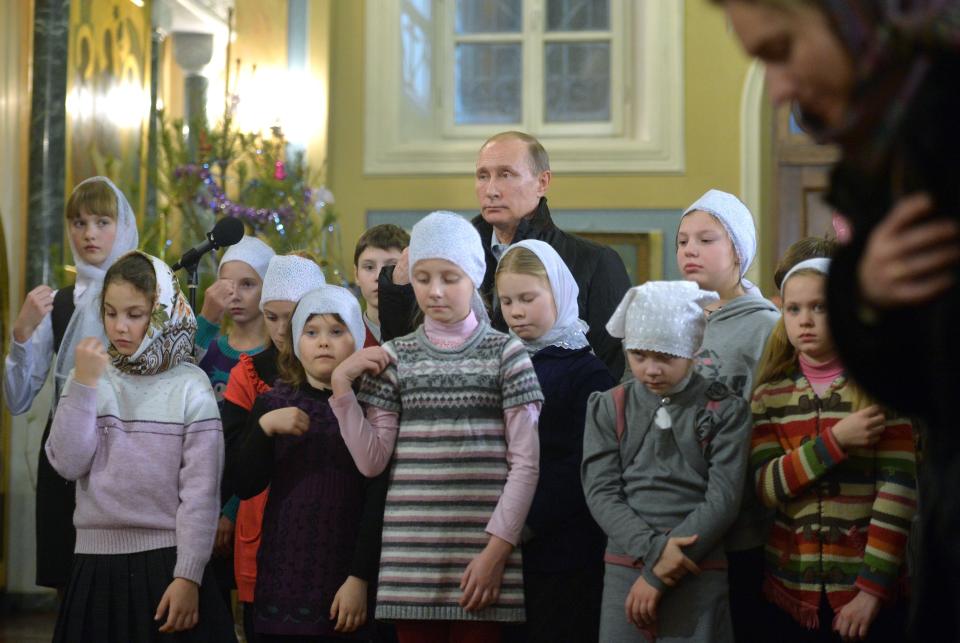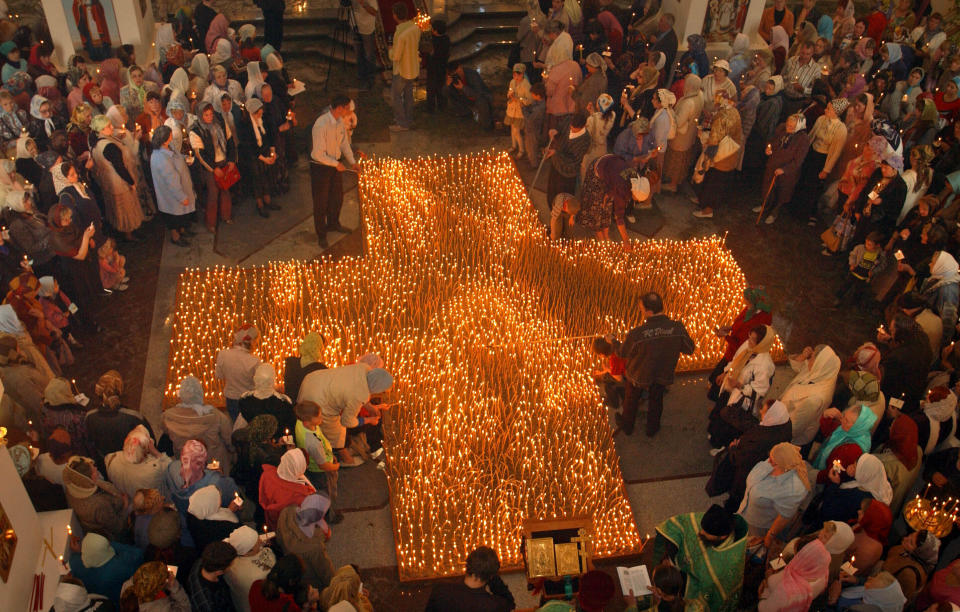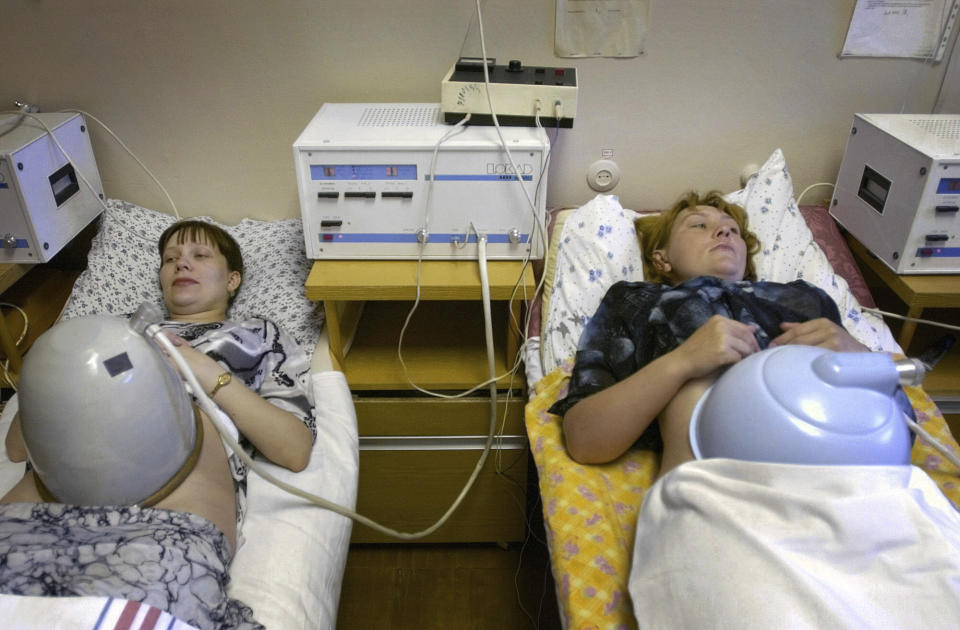DASHA LITVINOVA
Thu, November 9, 2023



Two pregnant women undergo an examination in a family planning center in Yekaterinburg, Russia, on July 23, 2003. Over three decades, Russia went from having some of the world's least-restrictive abortion laws to being what officials call a bulwark of “traditional values,” with the health minister condemning women for prioritizing careers over childbearing.
(Ural Press Photo via AP, File)
TALLINN, Estonia (AP) — Russian-installed health officials in Crimea said Thursday that private clinics on the Moscow-annexed peninsula have “voluntarily” stopped providing abortions, which means that the procedure is now only available there in state-run medical facilities.
The move comes amid a wider effort in Russia to restrict abortion, still legal and widely available, as the country takes an increasingly conservative turn under President Vladimir Putin.
Over his more than two decades in power, Putin has forged a powerful alliance with the Russian Orthodox Church and has put “traditional family values,” as well as boosting the country's declining population, at the cornerstone of his policies.
As part of the effort, authorities in several Russian regions in recent months sought to convince private clinics to stop terminating pregnancies. In Tatarstan in central Russia, officials said about a third have agreed to stop offering abortions; in the Chelyabinsk region in the Ural mountains, several clinics did as well. In the westernmost region of Kaliningrad, local legislators said they were mulling a ban for private clinics.
A nationwide ban is also something lawmakers and Russia's Health Ministry are contemplating, alleging that private clinics frequently violate existing regulations restricting access to abortion.
State statistics show that private clinics in Russia, where free, state-funded health care is available to all citizens, accounted for about 20% of all abortions in recent years. Some women who shared their experiences in pro-abortion online communities said they preferred private clinics where they could get an appointment faster, conditions were better and doctors did not pressure them to continue the pregnancy.
Crimea's Russian-installed health minister, Konstantin Skorupsky, said in an online statement that private clinics on the peninsula some time ago "offered to contribute to improving the demographic situation by giving up providing abortions,” and as of Thursday, all of them had done so.
His statement did not mention the city of Sevastopol, which is administered separately, and it was unclear if private clinics there were still providing abortions.
Two chains of private clinics in Crimea contacted by The Associated Press on Thursday by phone confirmed they no longer provide abortions, citing orders from the management or the authorities. One said it's been about a month since they stopped offering the procedure to women.
Moscow annexed Crimea from Ukraine in 2014 in a move that was not globally recognized. Ukraine has vowed to take back the peninsula.
Putin said last week that “the problem abortion is acute” in Russia, but there “is a question” on how to solve it: by imposing restrictions or introducing more support measures for families with children. The latter is something abortion opponents in Russia want to see, along with further restrictions like a ban for private clinics.
Women in Russia can terminate a pregnancy up until 12 weeks without any conditions, until 22 weeks in case of rape, and indefinitely if there are medical reasons to do it.
However, they must wait 48 hours or a week, depending on the stage of pregnancy, between their first appointment and the procedure itself, in case they reconsider.
They also are offered psychological consults designed to discourage them from terminating their pregnancy, and told to fill out an online “motivational questionnaire” outlining state support if women continue the pregnancy.
In Crimea, Skorupsky said about 21% of women seeking abortions between January and September 2023 changed their mind after having psychological consults.
New regulations adopted in recent weeks also restrict the sales of abortion pills used to terminate pregnancies in the first trimester and many emergency contraceptives, which are taken within days of unprotected sex to prevent pregnancy.
In addition, at least two Russian regions have outlawed “encouraging” abortions, and another is pondering such a ban.
TALLINN, Estonia (AP) — Russian-installed health officials in Crimea said Thursday that private clinics on the Moscow-annexed peninsula have “voluntarily” stopped providing abortions, which means that the procedure is now only available there in state-run medical facilities.
The move comes amid a wider effort in Russia to restrict abortion, still legal and widely available, as the country takes an increasingly conservative turn under President Vladimir Putin.
Over his more than two decades in power, Putin has forged a powerful alliance with the Russian Orthodox Church and has put “traditional family values,” as well as boosting the country's declining population, at the cornerstone of his policies.
As part of the effort, authorities in several Russian regions in recent months sought to convince private clinics to stop terminating pregnancies. In Tatarstan in central Russia, officials said about a third have agreed to stop offering abortions; in the Chelyabinsk region in the Ural mountains, several clinics did as well. In the westernmost region of Kaliningrad, local legislators said they were mulling a ban for private clinics.
A nationwide ban is also something lawmakers and Russia's Health Ministry are contemplating, alleging that private clinics frequently violate existing regulations restricting access to abortion.
State statistics show that private clinics in Russia, where free, state-funded health care is available to all citizens, accounted for about 20% of all abortions in recent years. Some women who shared their experiences in pro-abortion online communities said they preferred private clinics where they could get an appointment faster, conditions were better and doctors did not pressure them to continue the pregnancy.
Crimea's Russian-installed health minister, Konstantin Skorupsky, said in an online statement that private clinics on the peninsula some time ago "offered to contribute to improving the demographic situation by giving up providing abortions,” and as of Thursday, all of them had done so.
His statement did not mention the city of Sevastopol, which is administered separately, and it was unclear if private clinics there were still providing abortions.
Two chains of private clinics in Crimea contacted by The Associated Press on Thursday by phone confirmed they no longer provide abortions, citing orders from the management or the authorities. One said it's been about a month since they stopped offering the procedure to women.
Moscow annexed Crimea from Ukraine in 2014 in a move that was not globally recognized. Ukraine has vowed to take back the peninsula.
Putin said last week that “the problem abortion is acute” in Russia, but there “is a question” on how to solve it: by imposing restrictions or introducing more support measures for families with children. The latter is something abortion opponents in Russia want to see, along with further restrictions like a ban for private clinics.
Women in Russia can terminate a pregnancy up until 12 weeks without any conditions, until 22 weeks in case of rape, and indefinitely if there are medical reasons to do it.
However, they must wait 48 hours or a week, depending on the stage of pregnancy, between their first appointment and the procedure itself, in case they reconsider.
They also are offered psychological consults designed to discourage them from terminating their pregnancy, and told to fill out an online “motivational questionnaire” outlining state support if women continue the pregnancy.
In Crimea, Skorupsky said about 21% of women seeking abortions between January and September 2023 changed their mind after having psychological consults.
New regulations adopted in recent weeks also restrict the sales of abortion pills used to terminate pregnancies in the first trimester and many emergency contraceptives, which are taken within days of unprotected sex to prevent pregnancy.
In addition, at least two Russian regions have outlawed “encouraging” abortions, and another is pondering such a ban.
No more abortions at private clinics in occupied Crimea, Russian proxies say
Abbey Fenbert
Fri, November 10, 2023

Russian-installed authorities in occupied Crimea said that private clinics throughout the peninsula have stopped providing abortions, the Associated Press (AP) reported Nov. 9.
The officials claimed that the clinics had "voluntarily" stopped offering the procedure, meaning abortions can only be accessed at government health centers.
The AP contacted two chains of private clinics in occupied Crimea who confirmed that they are no longer offering abortions. The clinics said the orders to stop the procedure came from management or officials.
One clinic said it has been a month since abortion services were provided at their site.
Konstantyn Skorupskyi, Russia's proxy in charge of the health ministry in Crimea, said in an online statement that the clinics had “offered to contribute to improving the demographic situation by giving up providing abortions."
Russia has been pushing for greater restrictions to abortion access under the leadership of dictator Vladimir Putin, who has cultivated an alliance with the Russian Orthodox Church. Anti-abortion messaging stresses traditional "family values" and the need to reverse the decline in Russia's population.
Officials in Russia's Kursk Oblast also reported on Nov. 9 that private clinics in the region had stopped providing abortions. Authorities in Tatarstan and Chelyabinsk previously announced that local private clinics had stopped offering abortions.
Pregnant patients in Russia who seek abortions are offered psychological consults that pressure them not to terminate.
Skorupskyi claimed that around 21% of women in Crimea who sought abortions between January and September 2023 reversed their decision after undergoing the consults.
Read also: Russia’s annexation of Crimea


No comments:
Post a Comment